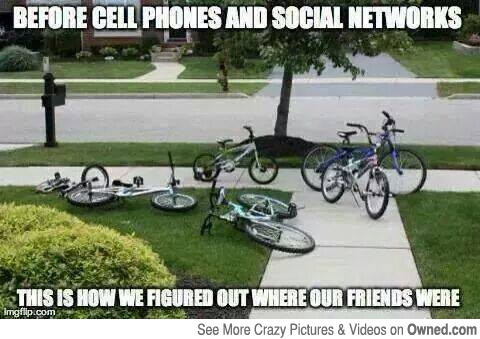The Path of Least Resistance Around Our Pedagogy
The Myth of the Good Ol’ Days
We’re going to lose.
I used to tell people that 80% of my job was finding creative ways to prevent kids from cheating. That was a bit of an exaggeration, but that’s how it feels sometimes, doesn’t it? We want kids to internalize their learning. We want them to be good, conscientious pupils, just like we were.  We want them to forgo all of the modern conveniences–cell phones, the internet, Google–and just learn it for themselves like we did. After all, we learned long division without a calculator. We memorized our times tables. We wrote paragraphs with our own hands. And then we re-wrote them in pen, also with our hands–only to re-re-write them in our own hands because we forgot to skip lines. We sent our friends notes. In full color, illustrated. If we wanted to hang out with our friends, we got up off the couch, put on our shoes (or not) and rode our bikes all the way over to their houses and left them strewn across their front lawns. Oh, the humanity!
We want them to forgo all of the modern conveniences–cell phones, the internet, Google–and just learn it for themselves like we did. After all, we learned long division without a calculator. We memorized our times tables. We wrote paragraphs with our own hands. And then we re-wrote them in pen, also with our hands–only to re-re-write them in our own hands because we forgot to skip lines. We sent our friends notes. In full color, illustrated. If we wanted to hang out with our friends, we got up off the couch, put on our shoes (or not) and rode our bikes all the way over to their houses and left them strewn across their front lawns. Oh, the humanity!
And if we had access to the technology today’s kids have back then, we would have done the same things kids do today.
 They’re quite savvy at it, aren’t they? Texting all the time. Socializing in ways that are more efficient than we could have dreamed back then–hanging out whenever they want from wherever they are. They speak in memes and emojis. They don’t use complete sentences or capitalization. And yet they’re remarkably good at getting their point across.
They’re quite savvy at it, aren’t they? Texting all the time. Socializing in ways that are more efficient than we could have dreamed back then–hanging out whenever they want from wherever they are. They speak in memes and emojis. They don’t use complete sentences or capitalization. And yet they’re remarkably good at getting their point across.
When it comes to school, they share answers to homework and quizzes, Google (it’s a verb) test questions to find the test bank freely posted online. Cutting and pasting whole paragraphs into their papers and getting away with it because we just don’t have the time to read all that stuff all the time. Oh, early in our careers, we did. We spent numerous hours calling home, filling out discipline referrals, meeting with our principals. At a certain point we declared that we were happy that they just turned something in. We’re running out of energy trying to keep them from taking the path of least resistance around our pedagogy.
And if they keep this up…
we’re going to lose. We are losing. All because we haven’t figured out how to change the game.
Ok, let’s not be that crude–it’s not a game at all, is it? What we do is real life, real learning. It’s not about winning or losing, it’s about kids. But in so many ways, we’re working so very hard and seeing so very few results. What we’re losing is not a game, we’re losing them. Kids. But it’s not for want of trying.
We like to blame them. “Kids these days…” And when that doesn’t make us feel better, we like to blame everyone else. And everyone else blames us. “Those teachers…” And while everyone is busy blaming everyone else, no one is winning. We digress…
Kids with technology are capable of way more than kids without.
Don’t believe me? Interpose “Adults” into that statement instead of kids. And then give me your cell phone. Yeah, I know you can think of all kinds of exceptions. That’s not the point. The point is that when kids have access to technology, they can do more. They will do more. We can expect more. And if we embrace their technological savvy, they will blow our accomplishments out of the water.
You’re not welcome, Google.
For too long we’ve banished technology from the classroom. Schools and teachers have spent months into years developing the official “cell phone policy”.  We’ve told them they can’t use Wikipedia, and no matter what they aren’t allowed to Google it. But why not? Isn’t that what we do? (Ok, some of us don’t… There’s a reason for the acronym LMGTFY.)
We’ve told them they can’t use Wikipedia, and no matter what they aren’t allowed to Google it. But why not? Isn’t that what we do? (Ok, some of us don’t… There’s a reason for the acronym LMGTFY.)
If we can do more with these things, why do we try like crazy to prevent our students from doing the same? Is it because they’re better at it than we are? Or because we want them to experience the same pain in learning that we did?
Perhaps we would be better off embracing the differences our students bring to our classroom. They’re not “worse” than we were. In fact, in a lot of ways, they’re better at so many things than we can say we were. Acquiring information, for one. Consider any topic and imagine ourselves in our day and a kid from today in a race to find the most information about the topic in a predetermined amount of time. Guess what: we lose. Every time. Even to the kid who may not have the highest test scores. Yet we continue to bemoan the fact that kids just aren’t what they used to be.
But kids don’t have to be what kids used to be.
What they do have to be is well adapted and equipped for survival in the world they will live in, not the world we used to. They need to be discerning gatherers of information who can do something with it. They need to be evaluators of text and media. They need to be creators and entrepreneurs. They need to be able to use what they have at their disposal for good, for productivity, for change, for brighter things, for the benefit of society.
They will use all this technology for naught if we let them. If we fail to show them how to use the available technology properly, they’ll sink into ways of continuing in their path of least resistance, trying to hide what they’re doing–because to be quite honest, they believe in what they’re doing.
It’s not going to go away.
We need to quit hiding from technology, pretending it’s going to go away. It’s not. Technology, by its very definition, will never go away. So what do we do? How do we adapt?
 We need to open the door. We need to create tasks and conditions that allow for and downright expect students to Google things. We need to show them how to evaluate and curate materials. We need to teach them how to create rubrics for websites, Youtube videos, and Instagram posts. We need to talk about ways to coordinate groups of people, how to take information and make something with it, how to generate new content, how to be trendsetters and thought leaders. We need to assume that there’s always a better way we don’t know about. We need to acknowledge that kids are capable of much more than we give them credit, they just might need to express it in a different way. We need to value their values and show them how to value ours.
We need to open the door. We need to create tasks and conditions that allow for and downright expect students to Google things. We need to show them how to evaluate and curate materials. We need to teach them how to create rubrics for websites, Youtube videos, and Instagram posts. We need to talk about ways to coordinate groups of people, how to take information and make something with it, how to generate new content, how to be trendsetters and thought leaders. We need to assume that there’s always a better way we don’t know about. We need to acknowledge that kids are capable of much more than we give them credit, they just might need to express it in a different way. We need to value their values and show them how to value ours.
…or we could continue doing the same darn thing.
Of course, we don’t have to change. We can continue using the same strategies we learned long ago. We can continue shaping our pedagogy in the same way it was fashioned for us.  We can continue using the same strategies we’ve read about, talked about, done PD on, become experts in, read the research on, that worked when the research was done but has little to do with what is actually happening in the world and minds of kids right this minute. We can get our data, make it say what we want it to say, and find creative ways to make it say even more than it was designed to say. And we can keep on pretending we don’t know why kids will do whatever they can to get around what we’re doing–while we take our own path of least resistance.
We can continue using the same strategies we’ve read about, talked about, done PD on, become experts in, read the research on, that worked when the research was done but has little to do with what is actually happening in the world and minds of kids right this minute. We can get our data, make it say what we want it to say, and find creative ways to make it say even more than it was designed to say. And we can keep on pretending we don’t know why kids will do whatever they can to get around what we’re doing–while we take our own path of least resistance.
Just do something.
Oh, we’re not lazy, we teachers. Neither are our students. We’ll blaze that path at lightning speed, with efficiency–just like they will. We won’t waste any time on things we don’t believe in. Neither will they. But if we really want to be good at what we do, we’ll acknowledge that path of least of resistance and place things of value in it. That, or we’ll build things no one wants to go around. But we have to do something. Nostalgia will get us nowhere. It really does depend on us. We, the teachers, are the molders and shapers of our kids’ experiences in our schools. We can do something. We should do something. And we will do something. Or someone else will.
